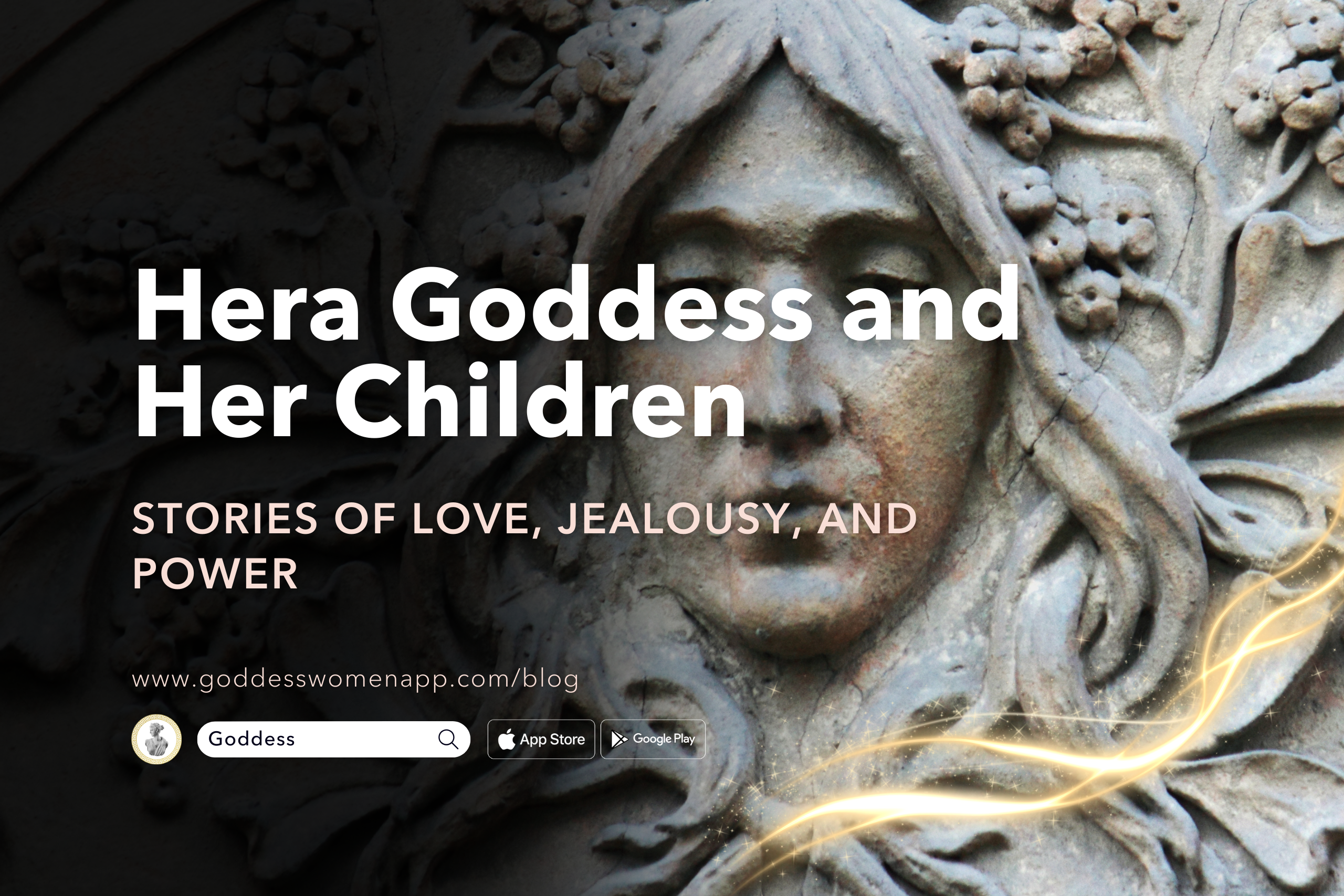Table of Contents
Introduction
In the pantheon of Greek mythology, Hera Goddess stands as a figure of majesty and complexity, embodying the roles of wife, mother, and queen of the gods with unparalleled dignity and strength. As the goddess of marriage and childbirth, Hera’s influence extends beyond the divine realm, touching the lives of mortals and deities alike. Married to Zeus, the king of the gods, Hera navigates the turbulent waters of divine politics and personal grievances, making her one of the most intriguing and multifaceted characters in ancient mythology. This blog post aims to delve into the stories of Hera, focusing on her relationships with her children and the themes of love, jealousy, and power that define her narrative.

Hera’s Complex Nature
Hera is a deity of contradictions. On one hand, she is the protector of marriage and the sanctity of the family, revered for her commitment to union and fidelity. On the other hand, Hera is also known for her fierce jealousy and vengeful schemes, particularly against Zeus’s numerous lovers and their offspring. This duality reflects the ancient Greek understanding of the divine as both benevolent and wrathful, capable of bestowing blessings and curses with equal fervor.
Hera’s complex nature is perhaps best understood through the lens of her marriage to Zeus. This union is fraught with infidelity and strife, with Zeus’s countless affairs igniting Hera’s wrath time and again. Yet, despite her husband’s indiscretions, Hera remains a steadfast figure of power and authority, never allowing her personal grievances to diminish her status as queen of the gods. Her responses to Zeus’s betrayals—ranging from cunning plots to punish her rivals to outright expressions of anger—highlight her resourcefulness and determination.
However, Hera’s complexity extends beyond her reactions to Zeus’s infidelities. She is a mother, and her relationship with her children further illustrates the multifaceted aspects of her character. From her nurturing side, seen in her interactions with certain offspring, to the challenges she faces in accepting Zeus’s illegitimate children, Hera’s maternal instincts add depth to her persona. Her actions, motivated by a mix of love, jealousy, and the desire for power, paint a picture of a goddess whose influence is as vast as her emotions are deep.
Through the stories of Hera and her children, ancient myths explore themes that remain relevant today: the balance of power within relationships, the complexities of family dynamics, and the enduring struggle to reconcile love with jealousy. As we delve into these stories, we gain insights not only into the character of Hera but also into the values and concerns of the society that worshipped her.

The Marriage of Hera and Zeus
In the tapestry of Greek mythology, the union between Hera, the Greek goddess of marriage, and Zeus, the king of the Olympian gods, stands as a paradigm of divine relationships, encapsulating the complexities and dynamics of the gods of Greece. This marriage, arranged by Hera herself, was marked by both profound love and tumultuous strife, reflecting the dual nature of Hera as both a devoted wife and a jealous partner. Zeus, known for his amorous adventures, frequently tested Hera’s patience and fidelity with his affairs with mortal women and immortal goddesses alike.
Their celestial wedding, celebrated by all the gods on Mount Olympus, was a pivotal event in Greek mythology, symbolizing the amalgamation of power and the intricate relationships among the Greek gods. Despite Zeus’s numerous indiscretions, Hera maintained her stature as the queen of the gods, often employing her vengeful nature to exact retribution on Zeus’s lovers and their offspring, thereby upholding her role as the protector of marriage women and the sanctity of marital vows in the Greek world.
The story of Zeus disguised as a cuckoo bird to win Hera’s affection, only to reveal his true form and consummate their love, is a testament to the lengths to which Zeus would go to appease Hera. This myth, among others, highlights the dynamic interplay of love, power, and jealousy that characterized their marriage, offering insights into the values and norms of Greek culture and the importance placed on marriage and fidelity.
Hera’s Offspring
The offspring of Hera and Zeus include several key figures in Greek mythology, each embodying different aspects of the divine and human experiences. Ares, the god of war, born from Hera alone as a demonstration of her power, or with Zeus, represents the destructive and chaotic nature of conflict, reflecting Hera’s complex emotions towards her husband’s affairs. Hephaestus, the god of craftsmanship, was given birth by Hera in retaliation for Zeus giving birth to Athena, symbolizing the competitive nature of their relationship. Despite being thrown from Mount Olympus by Hera for his imperfection, Hephaestus’s return signifies the resilience and redemption possible within the Greek pantheon.
Hebe, the goddess of youth, and Eileithyia, the goddess of childbirth, further underscore Hera’s connection to the themes of vitality, fertility, and the maternal aspects of life. These deities highlight Hera’s roles beyond the jealous wife and vengeful nature, showcasing her as a nurturer and protector of the familial and societal order.
The stories of Hera’s offspring are interwoven with the myths of other Greek gods and heroes, including the famous Hercules, Zeus’s son by a mortal woman, whom Hera tormented out of jealousy, yet ultimately could not deny his place in Olympus. These narratives reflect the interconnectedness of the gods in Greek mythology, illustrating how Hera’s relationships with her children and stepchildren were influenced by her feelings towards Zeus’s affairs, her own desire for respect and authority, and the overarching dynamics of power and retaliation among the deities.
In conclusion, the marriage of Hera and Zeus, along with their progeny, serves as a cornerstone of Greek mythology, offering profound insights into the complexities of divine relationships and the human emotions mirrored in these myths. Through the stories of Hera, the Greek goddess of marriage, and her offspring, the ancient Greeks navigated the realms of love, jealousy, and power, leaving a legacy that continues to fascinate and inform our understanding of Greek culture, mythology, and the timeless dynamics of relationships.

Hera’s Relationship with Other Divine Offspring
Hera, the Greek goddess of marriage, exhibited a complex relationship with the divine offspring of her husband Zeus, particularly those born from his affairs with mortal and immortal women. Her interactions with these children were often marked by her jealous wife persona and vengeful nature, reflecting the tumultuous dynamics within the Olympian family. Despite these challenges, Hera’s actions towards Zeus’s children were not uniformly harsh, and her relationships with them varied significantly, offering a nuanced view of her character in Greek mythology.
One of the most notable examples of Hera’s wrath is her treatment of Hercules (Heracles), the son of Zeus and the mortal woman Alcmene. Hera’s jealousy towards Hercules began before his birth and continued throughout his life, culminating in the famous Twelve Labors, which were indirectly instigated by her machinations. Yet, Hercules’s apotheosis and eventual acceptance into Mount Olympus symbolize the complex relationship between Hera and Zeus’s offspring, where enmity can turn into recognition of worthiness.
Athena, the goddess of wisdom, who emerged fully formed from Zeus’s head, also had a unique connection with Hera. Despite Athena’s prestigious birth, Hera’s rivalry with her was less pronounced, likely due to Athena’s virgin status and her role as a strategic and intellectual counterpart among the Olympian gods. This relationship underscores Hera’s ability to differentiate her responses based on the nature and actions of Zeus’s children, rather than a blanket animosity towards all.
Aphrodite, the goddess of love and beauty, born from the sea foam after Cronus threw the genitals of Uranus into the ocean, represents another intriguing dynamic. Though not directly a child of Zeus, Aphrodite’s influence among the gods and mortals often intersected with Hera’s domains, leading to both cooperation and contention, such as in the events leading to the Trojan War over the golden apple inscribed “to the most beautiful goddess.”

Cultural and Religious Worship of Hera
In the Greek world, Hera was revered not just as the queen of the gods but also as a deity deeply connected to the life stages of women, from marriage to childbirth. Her worship was widespread across Greece, with significant temples dedicated to her in cities like Argos and Samos, reflecting her importance in Greek culture and religion.
The Homeric Hymn to Hera illustrates her as a majestic and divine figure, wearing a high cylindrical crown and often depicted with the peacock, her sacred animal, symbolizing her beauty and regal nature. Festivals such as the Heraia, celebrated in her honor, highlighted her role as the protector of marriage and the patroness of married women, underscoring her connection to fertility and the well-being of the community.
The Greeks weren’t alone in their veneration of Hera; the Romans identified her with Juno, their own goddess of marriage and childbirth, further testifying to Hera’s enduring significance across cultures. Her temples served as sanctuaries for women, and her myths conveyed essential lessons about the complexities of divine and human relationships, power dynamics, and the pursuit of respect and recognition within the pantheon.
Hera’s worship and the stories that surround her offer valuable insights into ancient Greek and Roman perceptions of divinity, gender roles, and the societal importance of marriage and family. Through her myths and the cultural practices dedicated to her, Hera remains a symbol of the powerful, albeit complex, roles women played in the mythology and society of the ancient world, illustrating the timeless themes of love, jealousy, and the quest for power and recognition.
Hera’s Legacy
The legacy of Hera, the Greek goddess of marriage and queen of the Olympian gods, is a rich tapestry woven through the annals of Greek mythology and the reverence of ancient cultures. As the embodiment of marital fidelity, albeit with a vengeful nature towards Zeus’s affairs, Hera’s influence stretches far beyond the myths of Mount Olympus, offering insights into the ancient Greek world’s values and the complexities of divine and human relationships. Her narratives, from the Homeric hymn celebrating her majesty to the stories of her interactions with gods and mortals alike, underscore the multifaceted roles she played in Greek culture.
Hera’s enduring significance is reflected in the numerous temples erected in her honor across Greece, from Athens to Argos, where her festivals were celebrated, and her virtues extolled. The peacock feather, symbolizing her beauty and regal presence, and the cuckoo bird, associated with Zeus’s cunning courtship of her, remain enduring symbols of her legacy. Moreover, Hera’s role in seminal events like the Trojan War, precipitated by the golden apple’s contest, highlights her central position in the pantheon and the narratives that shaped the ancient world.
Through her children, both divine and mortal, and her interactions with Zeus’s offspring from other unions, Hera’s stories explore themes of power, jealousy, fidelity, and redemption. Characters like Hercules, Hebe, and Hephaestus, each with their unique connection to Hera, embody the diverse aspects of her divinity, from the protective and nurturing mother to the jealous wife and queen of the gods who demanded respect and acknowledgment.
To expand on the legacy and exploration of Hera within the context of Greek mythology, let’s delve deeper into the intricacies of her identity and her pivotal role among the Olympian deities, under the specified headings.

Hera Goddess
Hera, venerated as the goddess of marriage and childbirth, represents the epitome of regal dignity and authority on Mount Olympus. Her divine persona is intricately tied to the sanctity of marriage, embodying the ideals and challenges inherent in matrimonial bonds. Hera’s steadfast commitment to her roles, despite the tumultuous nature of her marriage with Zeus, showcases her as a figure of unwavering strength and resilience. Beyond her wrath and retribution lies a deity deeply committed to the order and sanctity of the divine and mortal realms, making her worship integral to the fabric of ancient Greek religious practices.
Greek Mythology
Greek mythology, a corpus of myths and legends belonging to the ancient Greeks, concerning their gods and heroes, the nature of the world, and the origins and significance of their religious practices, serves as a rich backdrop to Hera’s story. Within this mythology, Hera stands as a central figure, involved in numerous narratives that highlight her multifaceted nature. From the tales of her marriage to Zeus to her interactions with other deities and mortals, Hera’s presence is emblematic of the complexities of divine life and the moral lessons intended for the ancient Greek audience.
Greek Goddess
As a Greek goddess, Hera embodies the quintessence of divinity and femininity within the Greek pantheon. Her portrayal as a devoted wife (her husband Zeus), protective mother, and powerful queen encapsulates the ideal qualities revered in Greek society, while also reflecting the gender dynamics and societal expectations of the time. Hera’s divine attributes and responsibilities highlight the reverence afforded to female deities in Greek religion and their significant roles in shaping the myths and cultural ethos of ancient Greece.

Greek Goddess Hera
The Greek goddess Hera’s narrative is replete with themes of loyalty, justice, and the pursuit of respect and recognition. Her dedication to the institution of marriage, despite the personal betrayals she faces, underscores her role as a guardian of marital fidelity and family honor. Hera’s endeavors to maintain her dignity and authority amidst the challenges posed by Zeus’s infidelities and the machinations of Olympus reflect the complexities of her character as both a deity and a symbol of indomitable will and perseverance.
Greek Gods
Among the Greek gods, Greek Goddess Hera is distinguished by her status as both the sister and wife of Zeus, the king of the gods. Greek God Zeus fell in love with Hera at first sight. This dual relationship places her at the zenith of the divine hierarchy, allowing her a significant degree of influence over both the celestial and terrestrial domains. Her interactions with other gods and goddesses often reveal the diplomatic and sometimes contentious dynamics within the Olympian family, highlighting the balance of power, loyalty, and rivalry that characterizes the relationships among the deities. Greek Goddess Hera’s role in the pantheon exemplifies the interconnectedness of the gods in Greek mythology, underscoring the importance of familial bonds and the pursuit of justice and order in the divine realm.
Through these sections, we gain a deeper understanding of Hera’s significance within Greek mythology, her embodiment of divine and feminine ideals, and her enduring influence as a goddess revered for her strength, cunning, and commitment to the values she represents.
Conclusion
Hera, the cow-eyed and most beautiful Greek goddess, wearing her high cylindrical crown, stands as a testament to the ancient Greeks’ intricate understanding of the divine. Her stories, filled with gods and goddesses, heroes and mortals, love and betrayal, continue to fascinate and instruct, offering a window into the soul of Greek mythology and culture. As the queen of the gods, Hera’s legacy is a powerful reminder of the enduring nature of myth and its capacity to reflect the deepest truths about humanity, divinity, and the world they inhabit.
In exploring Hera’s, the Greek Goddess’s, legacy, we are invited to reflect on our own connections to the divine feminine and the archetypes that shape our understanding of power, relationships, and self. For those drawn to the mysteries of Greek mythology and the lessons of its deities, the Goddess app offers a unique opportunity to discover your feminine goddess archetype. Dive into the rich world of mythology, connect with the stories of Greek Goddess Hera and her counterparts, and explore the divine feminine that resonates with your spirit and life journey. Whether you are inspired by the strength of Hera, the wisdom of Athena, or the beauty of Aphrodite, the Goddess app is your portal to exploring these timeless archetypes and their relevance to modern life.
Discover your goddess archetype today and embrace the legacy of Hera and the pantheon of Greek goddesses that have inspired, guided, and empowered generations.





